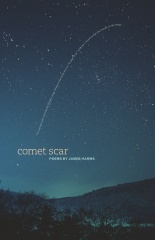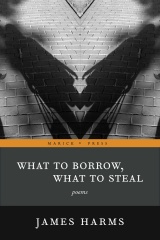Jim Harms on His Forthcoming Books and Writing
Jim Harms on His Forthcoming Books and Writing
By Connie Pan

If you haven’t already met him, Jim Harms, a Professor of English here at WVU, has this airy laidback coolness to him as if he still has California in his hair. Because I’m in the fiction MFA Program, for the first year, my contact with him would be limited to hall-passings and extracurriculary things. In the hall, we’d smile and nod. At Creative Writing functions and in emails, each time I’d introduce myself with the standard, “Hi, my name is Connie. I’m a fiction MFA.” That lead into “Thanks for hosting this reception.” Or “I enjoyed your reading.” Or “I’m interested in taking Poetry this fall.” He’d entertain me and let me go on until one day he said, smiling, “I know who you are, Connie.” See, him: airy laidback coolness. Me: fumbling bumbler—but that’s another kind of memorable and another kind of article.
Despite introducing myself to him 4,587 times, he allowed me to take his Poetry Workshop this fall. It is a class I look forward to every week because he is a wellspring of jokes, anecdotes, and is guns-ready with all those things we wish we could remember, like he’s a walking database for writers-on-writing quotes.
Not only is he a wonderful professor who is thoughtful and thorough with his feedback on work, willing to chat, and always-always motivating MFAs by sending calls for contests, fellowships, grants, and cool writer stuff, he is also the Director of the Low Residency MFA Program in Poetry at New England College, dedicated husband to Amanda Cobb, and loving father to Walt, Phoebe, Grace, and Dashiell. Plus, he’s busy racking up fellowships, grants, and publications of his own. Some of Jim’s credits include a National Endowment of the Arts Fellowship, the PEN / Revson Fellowship, and three Pushcart Prizes. He has been published in The American Poetry Review, Crazyhorse, The Kenyon Review, The Missouri Review, Poetry, Ploughshares, and that’s just to name a handful. He is the author of eight books in addition to two forthcoming volumes of poetry including What to Borrow, What to Steal from Marick Press (2011) and Comet Scar from Carnegie Mellon University (2012). Even though we’re all keeping track, he’s cool enough to lose count.

As the generous person that he is, Jim shared some insider information that can’t be found anywhere else about his forthcoming books. What to Borrow, What to Steal was birthed out of wonder. Jim divulges, “What to Borrow, What to Steal could have been subtitled, ‘Uncollected Poems’” because the volume began with a hundred poems that didn’t quite fit in his previous collections over the last fifteen years, and he wondered what he could do with them.
For the most part, Comet Scar is a book of homages and elegies inspired by other artists or works of art. Some points of inspiration for Jim were Jimmy Cliff, Cary Grant, and Bill Murray, and ten poems in the collection are elegies for Grant McLennan, an Australian singer/songwriter who Jim honors for redirecting his work. Jim explains, “[Comet Scar is] about how art exists in our daily lives, how it helps us endure and persevere. The epigraph . . . from James Salter . . . sums [it] up rather directly: ‘How can we imagine what our lives should be without the illumination of the lives of others?’”
So, where do these myriad poems come from? A lot of writers are reluctant to talk about the creative process because it is a mysterious, slippery thing, but Jim delves right in, “One of the things I like best about writing is making stuff up, but I rely on recognizable names and landscapes to create and maintain verisimilitude. Yes, my poems are often about my family and friends, but they don’t attempt to recreate specific dramatic situations. As most poets will say, I’m more interested in the truth than the facts. What happens, if I’m lucky, when I’m writing a poem is that I very quickly find myself falling into that trance that’s so necessary to creating art.” Even though Jim has two forthcoming collections, he’s not slowing down anytime soon. “Along with making stuff up, the trance state that accompanies the writing of poems, that interaction of the imagination and language that seems to slow down time and expand our sense of the real, is one of the things that keeps me coming back to the page day after day.”
Not only is he not slowing down, he’s already thinking about future collections, “I could imagine putting together another book like What to Borrow in ten or fifteen years. There are always a lot of perfectly good poems that don’t make the team.” I’m sure—and I’m sure I’m not alone in the thought—that there will be books on top of books between then and now. On that thought, if you’re in the halls of Colson and see Jim make sure you stop to congratulate him because he makes WVU and Colson Hall oh-so-very-proud, and support one of our own by picking up What to Borrow, What to Steal and Comet Scar.

 Feed
Feed
Comments disabled
Comments have been disabled for this article.